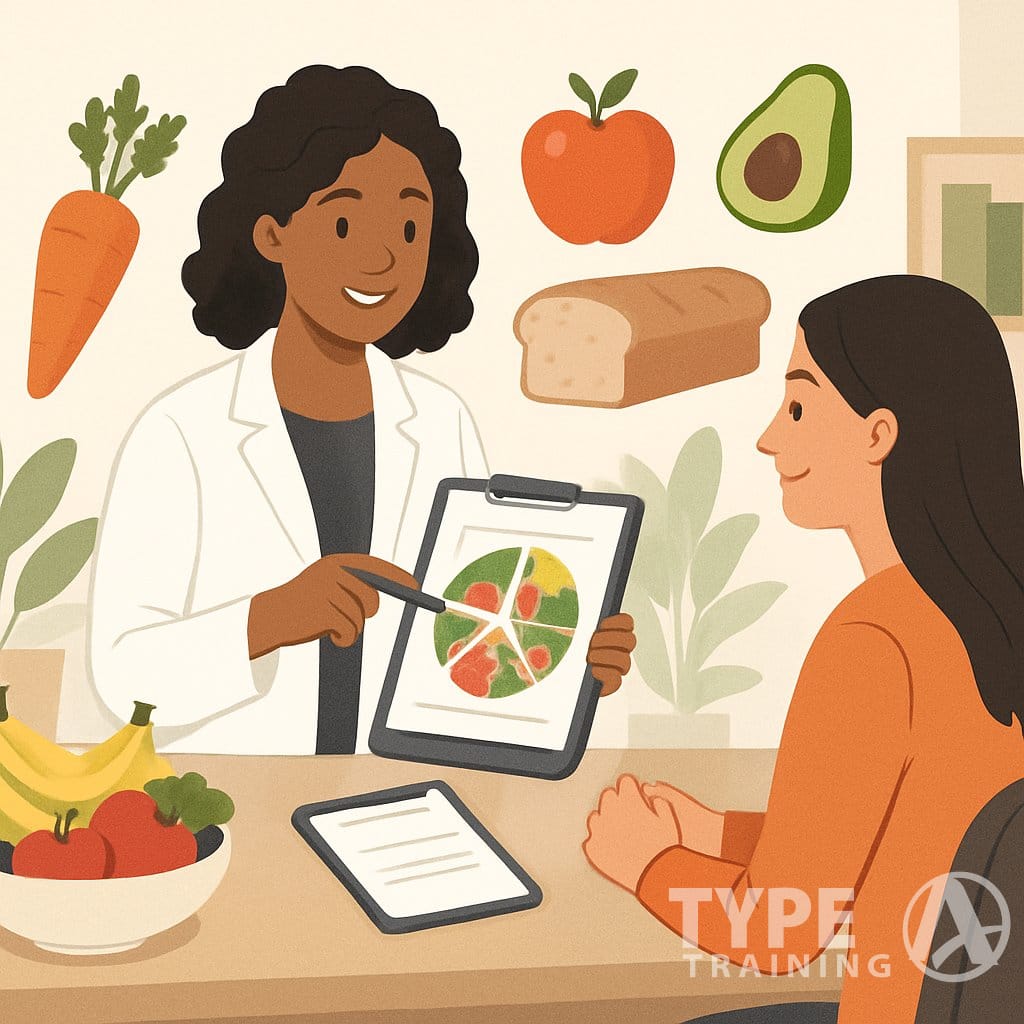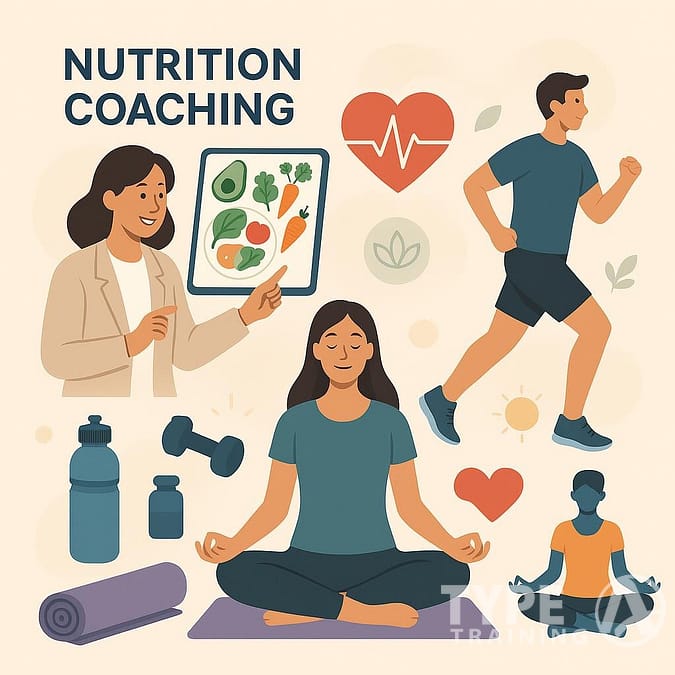Starting your nutrition coaching journey can feel overwhelming. Knowing what to expect during that initial session really helps.
Your first nutrition coaching session is crucial for understanding your journey.
Many people walk into their appointments unsure about the process. They wonder what questions they’ll get or how their coach will help them reach their health goals.
In your first nutrition coaching session, expect to learn valuable insights.
Popular posts:

Your nutrition coach will spend most of the session learning about your eating habits, health history, and personal goals to create a plan that fits your lifestyle. This assessment forms the foundation of your coaching relationship and helps shape your next steps.
Your first nutrition coaching session should help clarify your goals.
The session usually lasts about 60-90 minutes. You’ll talk, set goals, and come away with clear next steps for your health journey.
During your first nutrition coaching session, you will establish a partnership.
Key Takeaways
- Your coach will assess your current eating habits and health history to create a personalized plan
- The session focuses on setting realistic goals and identifying specific actions you can take immediately
- You’ll leave with a clear understanding of next steps and how ongoing coaching will support your success
Understanding Nutrition Coaching and Its Benefits
Knowing what to expect from your first nutrition coaching session can set the tone.

Nutrition coaching helps you build sustainable eating habits with personalized guidance. This approach stands apart from traditional dietary advice by looking at your relationship with food and offering practical strategies for real life.
Your first nutrition coaching session can be a transformative experience.
What Is Nutrition Coaching?
Nutrition coaching is a personalized way to improve your eating habits and overall health. Instead of quick-fix diets, the focus is on making changes that stick and actually fit your lifestyle.
Preparing for your first nutrition coaching session is key to success.
A nutrition coach works alongside you to develop sustainable eating patterns. They help you figure out which foods work best for your body and your goals.
Key components of nutrition coaching include:
-
- Personalized meal planning based on your preferences
- Grocery shopping strategies and tips
- Mindful eating techniques
Discussing your expectations in the first nutrition coaching session is essential.
- Craving management strategies
- Recipe ideas and meal prep guidance
Your coach reviews your current eating patterns and daily routine. They come up with a plan that fits your needs and challenges.
After your first nutrition coaching session, you will feel more empowered.
You’ll probably check in regularly and get ongoing support. This helps you stay on track and adjust your plan when things change.
How Nutrition Coaching Supports Wellness and Mental Health
Nutrition coaching isn’t just about changing what you eat. It digs into your mental relationship with food and your overall well-being.
Mental health benefits include:
Many find that their first nutrition coaching session helps them relax.
- Reduced stress around meal planning and food choices
- Improved confidence in making healthy decisions
- Better understanding of emotional eating patterns
- Enhanced self-awareness about hunger and fullness cues
The coaching process helps you develop coping skills that don’t revolve around food. You get tools to manage stress, emotions, and social situations without always reaching for a snack.
Your coach checks in regularly, which keeps you motivated and accountable. This kind of support can really ease anxiety about food choices and help you feel more confident.
As your eating patterns improve, your energy levels often go up, too. Better nutrition can boost your mood, focus, and mental clarity.
Differences Between Nutrition Coaches, Dietitians, and Health Coaches
A proper introduction in your first nutrition coaching session matters greatly.
It helps to know the differences between these professionals so you can pick the right one for you.
Nutrition Coach:
- Focuses on behavior change and habit formation
- Provides ongoing support and accountability
- May not require specific licensing or medical training
- Emphasizes practical, lifestyle-based approaches
Dietitian:
Your first nutrition coaching session is a pivotal moment in your health journey.
-
- Licensed healthcare professional with formal education
- Can diagnose and treat medical nutrition conditions
- Provides medical nutrition therapy
Completing your first nutrition coaching session can lead to long-term wellness.
- Often works in clinical or hospital settings
Health Coach:
-
- Takes a broader approach to overall wellness
- Addresses multiple lifestyle factors beyond nutrition
Reflecting on your first nutrition coaching session can yield insights.
- May include fitness, stress management, and sleep
- Focuses on general wellness rather than specific dietary issues
Your choice depends on your needs and health status. If you have medical conditions that require dietary changes, you’ll probably want a dietitian. For general wellness and habit changes, a nutrition coach or health coach might be more your speed.
Understanding the significance of your first nutrition coaching session is vital.
Choosing the Right Nutrition Professional

Finding the right nutrition professional can really impact your progress. Each type of professional offers different services and has a unique background that might fit your needs better.
Nutrition coach
A nutrition coach helps you build healthier eating habits and a better relationship with food. They focus on behavior changes and sustainable improvements, not medical treatment.
Sharing your goals during the first nutrition coaching session creates clarity.
Nutrition coaches work with you on meal planning and practical skills. This might include grocery shopping tips, meal prep, or strategies for eating out.
Most nutrition coaches aren’t licensed dietitians, but many have certifications in nutrition education. Some specialize in areas like weight management, sports nutrition, or general wellness.
Key services nutrition coaches provide:
-
- Meal planning and food guides
Thinking about the results of your first nutrition coaching session is crucial.
-
- Grocery shopping strategies
- Recipe ideas and cooking tips
- Mindful eating techniques
A successful first nutrition coaching session lays the groundwork for future meetings.
- Habit formation support
You’ll usually get regular check-ins for ongoing support. That makes it easier to stick with your goals over time.
Evaluating Credentials and Specializations
Check what training and certifications your nutrition professional has. Registered dietitians complete a degree in nutrition and pass a national exam—they can provide medical nutrition therapy.
Health coaches come from a range of backgrounds. Some focus on overall wellness, others on nutrition counseling. Look for certifications from organizations you trust.
After your first nutrition coaching session, tracking progress is essential.
Important credentials to look for:
- Registered Dietitians (RD/RDN): Licensed medical professionals
- Certified Nutrition Specialists: Advanced degree in nutrition
- Health Coach Certifications: From accredited programs
Ask about their experience with goals similar to yours. Someone who works with athletes might not be ideal if you need help with emotional eating.
Your first nutrition coaching session will guide your wellness journey.
Consider their nutrition philosophy. Some stick to strict meal plans, while others prefer flexible eating. Pick someone whose style fits your own.
Questions to Ask Before Your First Session
Ask potential nutrition professionals about their background and approach before you
Document your experience after your first nutrition coaching session for better understanding.
. It’s worth finding someone who matches your needs.
Essential questions to ask:
-
- What are your qualifications and certifications?
- How do you typically work with clients?
- What does your first session include?
Post-session reflections after your first nutrition coaching session can boost motivation.
- How often do you recommend follow-up meetings?
- What is your approach to meal planning?
Find out if they’ve worked with people who share your goals. If you have a medical condition, ask if they can coordinate with your doctor or refer you to a dietitian if needed.
Ask about their schedule and how they communicate. Some offer text support between sessions, while others stick to scheduled appointments.
Talk about pricing and what’s included. Some offer packages, others charge per session. Make sure you know what you’re getting before you start.
Preparing for Your First Nutrition Coaching Session
Getting ready for your first session means filling out paperwork about your health and thinking about what you want to achieve. The more prepared you are, the easier it is for your coach to create a plan that fits your life.
Filling Out Intake Forms and Providing Health History
Realizing the importance of your first nutrition coaching session will enhance your commitment.
Your coach will send you intake forms before you meet. These forms ask about your medical history, medications, and any health conditions.
Fill them out honestly and completely. Include details about past diets, what worked, and what didn’t.
Using feedback from your first nutrition coaching session will improve results.
List any food allergies or foods you can’t eat. This info helps your coach understand your needs.
Write down your current eating habits and when you usually eat. If you eat out a lot or cook at home, make a note of it.
Your coach needs to know your real eating patterns, not what you wish you did.
Mention any mental health concerns, like stress eating or anxiety around food. It’s more common than you think, and your coach can help if you’re honest.
Setting Goals and Expectations
Think about what you want before your session. Instead of just “lose weight,” get specific—how much, and by when?
Consider wellness goals, too. Maybe you want more energy or better sleep. Write down what success would look like for you in a few months.
Your first session will focus on behavior change over strict diet rules. Expect to talk about small changes, like drinking more water or eating breakfast.
Be realistic about what you can actually do each week. If you travel a lot, tell your coach so they can help you work around it.
Encourage openness in your first nutrition coaching session for better outcomes.
How to Make the Most of Your Initial Consultation
Come with questions about nutrition counseling and how things work. Ask about the schedule and what happens between sessions.
If you keep a food journal, bring it—even a few days’ worth is helpful. Don’t try to eat perfectly before your first meeting.
Talk about your biggest food challenges. If you snack at night or skip meals, say so. Your coach can’t help with problems they don’t know about.
Your first nutrition coaching session is about building trust with your coach.
Take notes during your session, or ask if you can record it. It’s easy to forget details later. If something doesn’t make sense, ask for clarification.
Step-by-Step Guide to Your First Nutrition Coaching Session
Reflect on your first nutrition coaching session to enhance future sessions.
Your first nutrition coaching session is all about building trust, looking at your current habits, and setting clear goals. These steps set the stage for real, lasting change.
Building Rapport and Sharing Your Journey
Your nutrition coach needs to get to know you before making any plans. This means talking about your history with food, diets, and wellness attempts.
Gaining insights from your first nutrition coaching session can spark change.
Be honest about past struggles with weight loss or health goals. Your coach has probably heard it all and won’t judge.
Talk about any medical conditions that affect your diet. Include medications, allergies, or digestive issues that impact what you can eat.
Share lifestyle details like your work schedule, family responsibilities, and stress levels. These things directly affect your eating patterns and how much time you have for meal prep.
Discuss your relationship with food—do you eat when stressed or bored? Are there foods that trigger cravings or guilt?
Your coach will also share their approach and experience. Ask about their background and how they’ve helped clients make lasting changes.
Embrace the learning opportunities your first nutrition coaching session provides.
This conversation builds trust between you and your nutrition coach. Trust makes it easier to follow advice and stay motivated, even when things get tough.
Reviewing Current Diet and Lifestyle
Your coach will take a close look at what you eat and drink during a typical day. If you’ve got a food journal, bring it along—or just be ready to talk through your usual meals and snacks.
Clarifying needs in your first nutrition coaching session helps tailor your plan.
Don’t try to make your eating habits sound better than they are. Your nutrition coach can only help if they get the real picture.
Expect questions about when you eat, portion sizes, and how often you grab takeout. These details help your coach spot patterns that might need a tweak.
Your coach will also ask about your cooking skills and what you have in your kitchen. They want to know if you can handle complicated recipes or if you need simple meal ideas.
Water, alcohol, and caffeine habits will come up too. These drinks really do impact your energy and hunger.
Utilize your feedback from the first nutrition coaching session for adjustments.
They’ll ask about your sleep and exercise routines. Your activity and rest shape your nutrition needs more than you might think.
Work lunches, family dinners, and weekend social events can be tricky. Talk about those situations so your coach knows what you’re up against.
Clarifying Health and Wellness Goals
Setting clear, measurable goals gives your coaching sessions direction. Vague ideas like “eat better” don’t really help when you’re trying to build a plan.
For weight loss, get specific—set a target amount and a realistic timeline. Your coach will help you figure out what actually makes sense for you.
Celebrate your developments post-first nutrition coaching session.
Many people want more energy or better moods. Share when you feel tired or sluggish, and what kind of energy you’re hoping for.
Some folks aim for better workouts, improved sleep, or sharper focus. Nutrition can help with all of that.
Let your coach know about foods you love or want to avoid. They’ll try to work with your tastes while keeping things balanced.
Lifestyle goals matter too, like getting better at meal prep or ordering confidently at restaurants. Those skills stick with you long-term.
Your coach will break big goals into smaller, weekly steps. That way, progress feels doable and you keep moving forward.
Your first nutrition coaching session is essential for tracking your journey.
Assessment and Personalized Recommendations
Your nutrition coach will ask lots of questions about your eating habits, health, and daily routines. They’ll use this info to come up with meal planning ideas and talk through changes you can actually make.
Dietary and Lifestyle Assessment
Your coach will review your health forms and food journals before you meet. They’ll ask about your current diet, meal times, and what you like to eat.
The assessment covers your medical history, medications, and any recent lab results. Sometimes coaches spot things in your labs that others missed.
You’ll talk about your daily routine, work schedule, and exercise. This helps your coach see how your lifestyle shapes your eating habits.
Your coach will ask if you have any allergies, intolerances, or foods you just can’t stand. They need this to build meal plans you’ll actually follow.
They’ll also check out your cooking skills, kitchen tools, and how much time you have for meal prep. These details shape the advice you get.
Continued reflection post-first nutrition coaching session improves motivation.
Initial Meal Planning Strategies
Your coach will put together a meal plan based on everything you’ve shared. Expect specific breakfast, lunch, and dinner ideas with the right portion sizes.
If you’re tracking macros, they’ll help you build meals to hit your protein, carb, and fat targets. They’ll explain how to make it work without overcomplicating things.
You’ll get simple recipes and meal ideas that fit your cooking skills and schedule. The focus is on making nutrition easier, not harder.
Your first nutrition coaching session can be a catalyst for long-term change.
Your coach will show you how to eat well when you’re out or traveling. They’ve got tips for staying on track in real life, not just at home.
Discussing Realistic Changes
Your coach will help you set goals that are specific, measurable, and actually doable. The aim is changes you can stick with, not just quick fixes.
You’ll pick two or three small tweaks to start instead of trying to change everything at once. This helps you avoid overwhelm and boosts your odds of success.
Reviewing your experiences in the first nutrition coaching session enhances accountability.
Together, you’ll talk about what might get in your way and come up with ways around those barriers. Planning for bumps ahead makes things smoother.
Your coach will help you figure out which changes will make the biggest difference for you. They’ll focus your energy where it counts most.
Implementing Behavior Change and Setting Action Steps
Establish ongoing strategies in your first nutrition coaching session for success.
Real change starts when you move from talking about goals to actually planning what you’ll do. You and your coach will set targets, plan for challenges, and keep track of what’s working.
Collaborative Goal Setting
Let your client take the lead on what they want to work on. Ask open-ended questions like, “What do you want to tackle first?” instead of just telling them what to fix.
Each first nutrition coaching session builds a stronger foundation for progress.
Write goals together as you talk. Make each one specific and easy to measure. For example, swap “eat better” for “add a vegetable to lunch three times this week.”
Break down big goals into bite-sized steps. If meal prepping every Sunday feels like too much, start with just two meals. Small wins build up confidence.
Let your client pick the goal that feels doable now. When people choose their own path, they’re way more likely to follow through.
Make sure goals fit into their real life. If someone’s a busy parent, they probably don’t have time for fancy meal plans. Help them find swaps that actually work.
Emphasizing the first nutrition coaching session’s importance drives commitment.
Strategies for Overcoming Challenges and Barriers
Help your client spot obstacles before they pop up. Ask, “What could get in your way this week?” Time, money, family, and stress are all common roadblocks.
Come up with backup plans together. If packing lunch might get skipped, think up quick options like overnight oats or wraps they can grab on the go.
Mental health matters here too. Stress, anxiety, or feeling low can make healthy choices tough. Acknowledge it, even if you’re not their therapist.
Teach simple problem-solving steps:
After your first nutrition coaching session, celebrate every small victory.
- Identify what didn’t go as planned
- Think of two other ways to handle it
- Pick one to try next time
- Practice the new approach
Focus on progress, not perfection. If there’s a setback, help your client learn from it instead of quitting. Try asking, “What would you do differently next time?”
Building on insights from your first nutrition coaching session fosters growth.
Monitoring Progress Between Sessions
Keep tracking simple. Maybe it’s checking off days they ate breakfast or texting you a photo of a meal they’re proud of.
Pick tracking methods that fit your client’s style. Some like apps, others prefer paper, and some just want to shoot off a quick text.
Plan for check-ins between sessions. Even a short text after a few days can catch problems early. Try asking something like, “How’d grocery shopping go?”
Track behaviors, not just outcomes. Weight moves slowly, but you can see if someone packed lunch every day. Watching actions shows progress sooner.
Your first nutrition coaching session sets the stage for future achievements.
Change the plan if it’s not working. If your client keeps hitting the same wall, maybe the goal’s too tough or not the right fit. Adjust together instead of pushing harder.
The Follow-Up: Planning for Ongoing Success
Sticking with nutrition counseling really comes down to regular follow-ups. Checking in and making adjustments helps people build habits that last.
Establishing a Follow-Up Schedule
Clarifying goals in your first nutrition coaching session ensures alignment.
Wrap up your first session with a clear plan for what’s next. Weekly sessions usually work best for the first month.
After that, you can move to every two weeks. That gives clients space to practice new habits but still keeps them supported.
Recommended Follow-Up Timeline:
-
- Week 1-4: Weekly sessions (30-45 minutes)
- Week 5-8: Bi-weekly sessions (30 minutes)
Refining techniques from your first nutrition coaching session can enhance outcomes.
- Month 3+: Monthly sessions (30 minutes)
Book the next appointment before your client leaves. It keeps things on track and shows you’re invested in their progress.
Send a reminder 24 hours before each session. Add a quick note about what you’ll talk about so they can prep if they want.
Some clients need more frequent check-ins when things get tough. Stay flexible and adapt your schedule if needed.
Evaluating Outcomes and Adjusting the Plan
Your first nutrition coaching session is a stepping stone to lasting change.
Start each follow-up by reviewing what happened since your last meeting. Ask about the specific goals you set together.
Use any measurable data you can—weight, energy, or how many times they meal prepped, for example.
Key Areas to Evaluate:
-
- Goal completion: Which targets did they hit or miss?
- Barriers: What got in the way?
Reviewing the journey from your first nutrition coaching session inspires progress.
- Wins: What went well?
- Energy and mood: How are they feeling overall?
If someone’s stuck, try a different approach instead of repeating the same advice. Maybe smaller steps or new strategies will work better.
Write down changes in the plan and explain why you’re making them. It helps clients see that setbacks are normal and part of the process.
Nutrition plans work best when you adjust them to fit each person’s real life and preferences.
Every first nutrition coaching session enriches your understanding of healthy habits.
Integrating Nutrition Coaching with Exercise and Wellness
Nutrition coaching really shines when you pair it with exercise and a whole-health mindset. Working with fitness pros can give you the best shot at real, lasting change.
Aligning Nutrition Plans with Physical Activity
Match your meal plans to your workouts and activity level. Cardio days and strength days need different fuel.
Consolidate lessons from your first nutrition coaching session into daily routines.
Pre-workout nutrition gives you energy. Try carbs like a banana, some oatmeal, or toast an hour or two before you exercise.
Post-workout meals help you recover. Eat some protein and carbs within half an hour after your workout to repair muscles and refill energy.
Your coach can tweak your daily calories based on how active you are. More movement usually means you need more food.
Don’t forget about hydration. Drink water before, during, and after exercise. Your coach can help you figure out how much you really need.
Holistic Approaches to Health and Lifestyle
Progress after your first nutrition coaching session reinforces your journey.
Wellness is more than just food and workouts. Sleep, stress, and your daily routines all play a role.
Your coach looks at your whole lifestyle. They’ll help you make changes that fit your work, family, and social life.
Real change happens slowly. Building one new habit at a time works way better than trying to change everything overnight.
Stress can mess with your eating. When you’re stressed, you might crave sugar or eat more. Your coach can show you other ways to cope.
Sleep really matters, too. Bad sleep can make you crave junk food, while good sleep helps you stick to your nutrition plan.
Your first nutrition coaching session prepares you for future challenges.
Hire a Personal Trainer for Best Results
Personal trainers and nutrition coaches make a pretty solid team. Together, they build a complete wellness plan that covers all the bases.
Your trainer comes up with workouts that line up with your nutrition goals. For example, if muscle growth is your thing, they’ll focus on strength training.
Your nutrition coach tweaks your protein intake to support those muscle gains. It’s a tag-team approach that just makes sense.
Accountability goes up when you have both pros in your corner. They each check your progress from different angles and help you stay motivated, even when you want to quit.
Connecting with your coach in the first nutrition coaching session enhances accountability.
Trainers notice problems with your form and technique. Bad form can totally waste all the good nutrition work you’re putting in—nobody wants that.
Goal setting gets way more specific with both coaches. You move from vague ideas like “get healthy” to clear targets, like “lose 10 pounds and deadlift 150 pounds in 12 weeks.”













